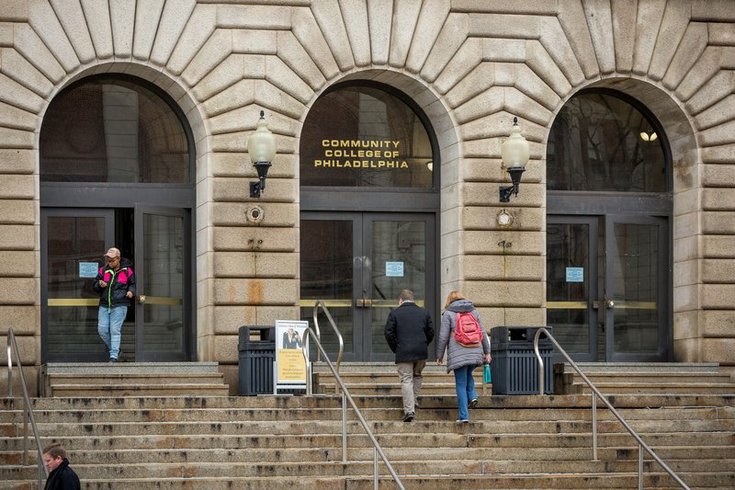
May 01, 2024
 Thom Carroll/For PhillyVoice
Thom Carroll/For PhillyVoice
According to the school's union, the Community College of Philadelphia's operating budget is supposed to be split evenly between the city, state and students.
Professors and other staff at the Community College of Philadelphia are asking for $20 million in additional funding from the city's upcoming budget.
Tenured and adjunct professors in the AFT Local 2026 union, who testified Wednesday before the City Council's Committee of the Whole, said they're not being paid enough and the school itself doesn't have the budget for a strong learning environment.
AFT Local 2026 said inflation has risen over 20% since 2020, but operational funding from the city has increased only 4%. That $20 million request for the fiscal year 2025 budget, which the union proposes comes from taxing the city's wealthy residents, would go toward having smaller class sizes and smaller caseloads for counselors and advisers, free transportation for students, bringing back the school's child care center, adding a full-time DEI coordinator, and wage increases for professors and staff.
Junior Brainard, an assistant professor of English and AFT Local 2026 co-president, said the school was founded on the idea that the city, state and students would all evenly contribute to its operating budget, each paying a third. In reality, he said students contribute about 42% to the school's $137.2 million operating budget, the city and state together account for 51%, and the school's reserves make up the rest.
"When we don't get money from the city, when we don't have that kind of public investment in the college, the burden is really put on the backs of students who then have to take out more student loan debt or they have less financial aid left over just to meet their regular living expenses," Brainard said.
According to Nate House, a professor of mass media and full-time faculty co-chair at the union, Mayor Cherelle Parker's proposed budget includes $10 million in additional funding for CCP. But those funds are for a proposed municipal workforce program, where students will get a stipend while they're in school and access to city jobs after graduation.
"Basically, that means for our operating budget for the rest of the school, that's flat funding for this year," House said.
The mayor's proposed five-year budget plan lays out $51 million for the school in addition to the $10 million investment. If that all went to the operating budget, that would be about 37% of the total, but Brainard said that number includes things like scholarships and other non-operational expenses.
M. Asli Dukan is an adjunct professor in the photographic imaging department at CCP. In her classroom, students make films about a college set in the near future, and they often pull from today's problems as source material to draw attention to the issues they face.
"What I'm learning from my students is that they want funding that keep their community safe, healthy and whole," Dukan said at the hearing. "They want a budget that invests in the most marginalized communities in Philadelphia, and my students know that additional funding can make their futures better because they're literally creating stories about the future."
AFT Local 2026 is in negotiations with the college for new contracts for full-time faculty, classified employees (like janitors and electricians), and adjunct and visiting lecturers. Contracts for all three groups expire in August.
Marissa Johnson-Valenzuela, an assistant professor of English at CCP, said even pay for tenure-track faculty like her isn't enough to support a family. Accounting for inflation, she said a starting salary for a full-time professor at CCP is 58% less that it was in 1980.
"I want you to understand, we don't have pensions, we are not milking it," Johnson-Valenzuela said. "We do this work because we care deeply about our students, and we need to be supported across the board."
Community colleges generally have lower graduation retention rates than other schools. The retention rate for full-time students at CCP is 54%, according to U.S. News and World Report. For part-time students, it's only 38%. A number of issues can cause a student to drop out, anything from housing insecurity to mental health issues to needing to take care of a loved one.
In his research paper class, House said he started the semester with 25 students. He expects about 16 or 17 to make it through to the end.
"The students that haunt me the most are the ones who don't make it, the geniuses who disappear halfway through the semester because the challenge has become too great to overcome," House said. "They're smart, beautiful people, and it breaks my heart every day when I see that empty seat."
Charlie Allison, an adjunct professor, said that the conditions of the school and classroom, in addition to students' home lives, affect how well they learn. He noted that students sometimes can't concentrate because they're hungry and can't afford food, or have to skip class to look after kids because the school doesn't offer free child care. In his classroom, the air conditioning and heat didn't work, so students were either sweating or shivering while they worked.
"If you hold on to one phrase from this, make it this one: teaching conditions are learning conditions," Allison said.